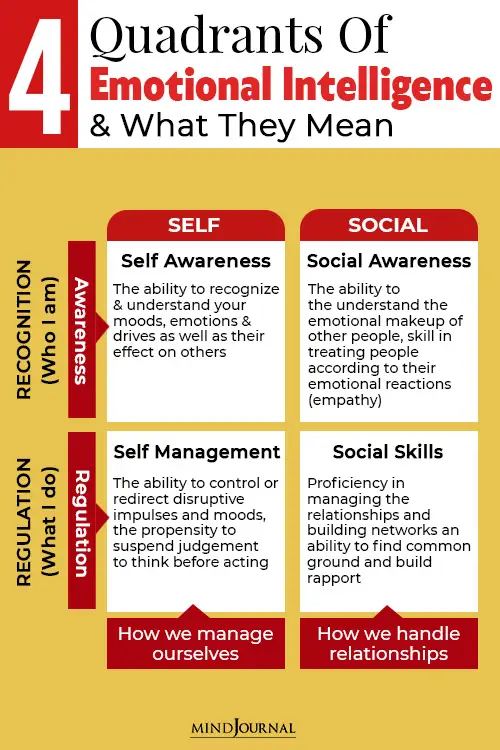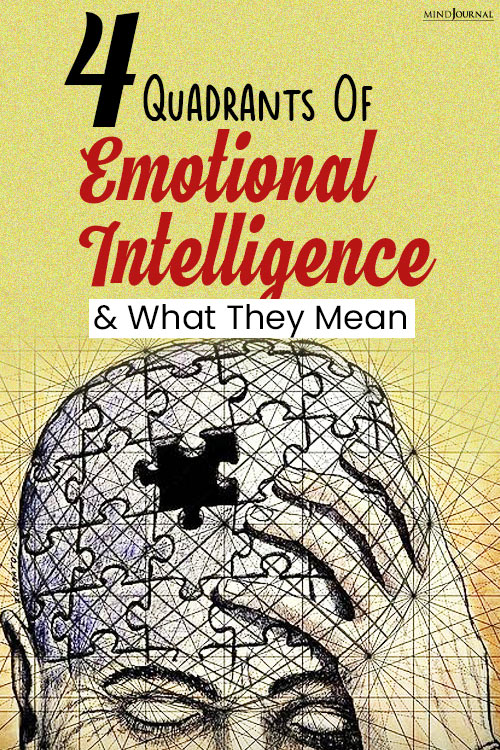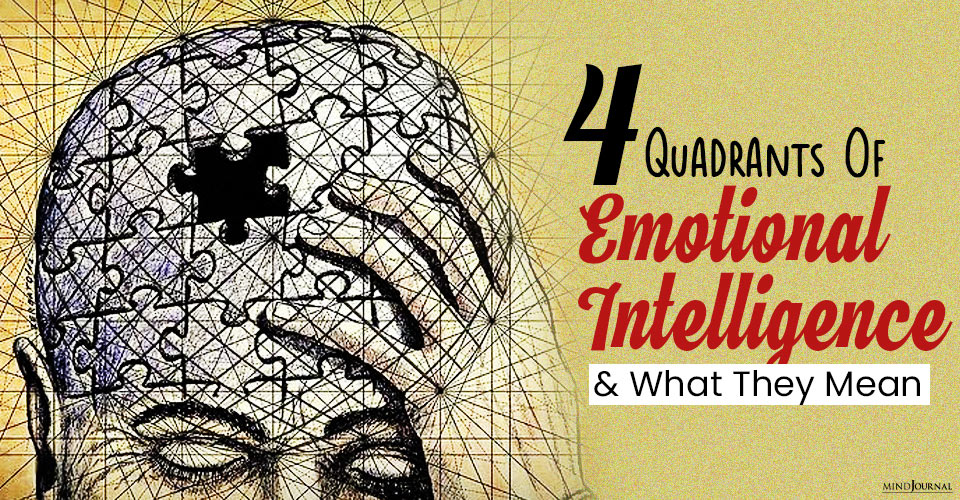The term emotional intelligence is being spoken now more than ever. While some people are really emotionally intelligent, some not so much. But what exactly is emotional intelligence and how does it work? To understand your emotional abilities more, first make yourself familiar with the 4 quadrants of emotional intelligence.
What Is Emotional Intelligence?
Emotional intelligence is the kind of intelligence and awareness that helps you understand what drives others and their feelings. When you have high emotional intelligence, you are better able to understand how someone else is feeling, and why they feel so; it also helps you not be too judgemental about anyone and anything.
It can also aid you in cooperating with others in a better and more genuine way. The more skill you have when it comes to understanding others’ emotional signals, the better you will be able to frame your own emotional responses to them. This can really help you a lot when it comes to being successful in life.
However, if you are someone who is not that emotionally intelligent, the good news is that it can be made better, and you can improve your level of emotional intelligence.
Related: 16 Signs Of Low Emotional Intelligence
Four Quadrants Of Emotional Intelligence
In 1995, Daniel Goleman published his book Emotional Intelligence, which stayed on the New York Times Best Seller list for one and a half years! This pointed towards the beginning of a new trend, which is why this idea went on to be widely known throughout the world.
Even though not everyone agrees and endorses Goleman’s model, the general consensus is that emotional intelligence does exist, and it plays a major part in everyone’s lives, at some moment or the other.
Now, Goleman’s model of emotional intelligence consists of five realms, which are then further divided into four quadrants.
The five realms are as follows:
- Recognize your emotions.
- Handle your emotions.
- Motivate and influence yourself.
- Perceive and try to understand other people’s emotions.
- Handle relationships (other people’s emotions).
Now, these five realms are further divided into four quadrants, also known as the Four Quadrants of Emotional Intelligence. They are as follows:
1. Self-Awareness
Self-awareness involves these factors:
- Self-confidence.
- Being aware of your emotional state.
- Understanding how other people’s actions impact your emotional state.
- Understanding how your own behavior can affect others.
Self-awareness is all about how well you are able to gauge and understand your own emotions, and also understanding their effect on you. Another important thing about having self-awareness is the ability to know and understand your strengths and weaknesses and be self-confident.
Knowing, and comprehending your various emotions, and moods, and also trying to understand what drives these moods is what this concept is all about. In order to properly grasp this concept and improve this skill, you need to expand and evolve your emotional states. Once you are able to do this, you will understand just how your emotional intelligence is affecting you as well as others.
Most of the time, your emotional awareness is a result of the following chain:
- Feeling and sensing the emotion.
- Noticing the emotion or feeling.
- Recognizing more facts.
- Accepting the feeling.
- Thinking, or even introspecting about why the feeling has come up in that moment. Try to look around if any other feelings are present apart from that feeling, or if they came before it. Speak to yourself, and try to gauge what it’s motive might be and what it’s trying to show you and tell you.
- Act on your emotions and feelings by doing what is appropriate, if necessary.
- Once the action is done, think about what you did, and what lesson you can take away from it.

2. Self-Management
Self-management involves these factors:
- Controlling turbulent impulses and emotions, and keeping them in check.
- Your actions reflecting your inherent values.
- Being flexible with change/changes.
- Going after your dreams and goals, despite challenges, setbacks and obstacles.
Self-management can be described as your ability to handle your emotions, feelings, thoughts, and actions, to get the results you are looking for. Self-management tendencies also involve showing the values of integrity, honesty, and dependability, experiencing a sense of achievement, and lastly, keeping your troublesome emotions in control.
It also entails being optimistic, spontaneous, flexible, adaptable, and grabbing onto new opportunities as and when they arrive. Anyone who is good at self-management knows very well how to be responsible, and select the right emotional response to situations.
Working on your self-management tendencies also involves training yourself to reframe or change stressful circumstances, into circumstances that are plainly a bit challenging. The moment you don’t let your emotional triggers control you and your responses are the moment you will finally be able to handle your emotions in the right manner.
Related: 15 Enlightening TED Talks on Emotional Intelligence
3. Social Awareness
Social awareness involves these factors:
- Understanding and gauging the mood of the environment.
- Thinking and considering what other people might be going through.
- Genuinely listening to what other people are saying.
Social awareness is the capability to correctly gauge, notice, and predict how and what others are feeling. In other words, reading the room and its vibe. This entails you using your empathetic abilities to sense what others are feeling and thinking, and understanding their perspectives.
However, don’t confuse empathy with sympathy and pity. Sympathy means you feel bad for someone and have pity on them for their unfortunate circumstances. On the other hand, empathy means trying to understand what the other person is feeling, taking their feelings into consideration, and using your emotional intelligence to respond to that situation.
When you have a lot of empathy, you will be able to get along with everyone else in a much healthier manner, and you will never be judgemental just because someone is different from you, or has different opinions.
Want to know more about emotional intelligence? Check this video out below!
4. Relationship Management
Relationship management involves these factors:
- Getting along well with other people.
- Managing conflicts in a healthy and effective manner.
- Talking about and expressing ideas in a transparent manner.
- Displaying empathy to another person and successfully handling interactions.
Relationship management revolves around the concept of when you take your own feelings, others’ emotions, and the surroundings you are in, in order to handle interactions accurately and properly. When you know you are good with relationship management then you know how to be a good leader, have amazing collaborative qualities, and know the essence of teamwork.
Motivating and guiding others, along with knowing how to handle escalating conflicts is also an important part of relationship management. Being skilled at persuasion is another important quality of relationship management.
And lastly, knowing how to push someone in the right direction, and bringing out their best with constructive criticism, guidance and feedback is another crucial facet of this.
How Can You Boost Your Emotional Intelligence?
Now that you know what emotional intelligence is, and its four quadrants, you must be wondering how you can improve it further. The good news is that there are a couple of things you can do, to boost your emotional intelligence, and with a little bit of practice and dedication, you will be able to have a higher level of it.
Here are some strategies that can help you raise your level of emotional intelligence:
1. Self-Awareness
- The way you describe something forms your perception of it.
- Accept and make peace with who you truly are.
- Work towards bettering your descriptions of the feelings you feel. For example, suppose you are feeling angry, so try defining how you exactly feel. Do you feel angry, anxious, hurt, or afraid?
- Assert yourself, and learn to say no to things that don’t give you peace. However, do this without causing any kind of offense.
- Always be open about your feelings.
- Be flexible, and practice flowing from one state of emotion to another.
- Control your impulses and impulsive actions.
Related: 10 Characteristics Common In People With High Emotional Intelligence
2. Self-Management
- Learn to manage your emotions, and practice how to handle them at the right time. Don’t let your emotions control you all the time.
- The more you practice regulating your emotions, the higher your emotional intelligence will be. For example, before reacting to a difficult situation, take a few deep breaths and come up with ways to handle it in a mature way.
- Consider other people’s emotions.
3. Social Awareness
- Recognize what others’ are feeling, and acknowledge the truth that most of them are controlled by their emotions like robots.
- Stop believing what others’ tell you, and learn to differentiate between fake and authentic emotions.
- Spend time with positive people, and people from whom you can learn a lot of good things. Consume positive things (reading, watching, listening).
- Try to give back to your community and the world in general, whenever you can.
4. Relationship Management
- Set boundaries as far as your emotions are concerned, and learn to understand the necessity of separating your feelings from other people’s feelings.
- You don’t have to imbibe, feel and react to every emotion that comes your way.
- Keep in mind that you don’t have to absorb everyone else’s emotions, as your own. Their emotions are theirs, they don’t always have to be yours.
Emotional intelligence helps you be aware of your emotions, and be smart about them. Being emotionally intelligent is not just about being nice and happy, it’s more about being honest, transparent, and authentic. Knowing and understanding how you feel, and how others feel is crucial to be authentic and true to yourself.
Frequently Asked Questions (FAQs)
What is the highest form of Emotional Intelligence?
Empathy is the highest form of Emotional Intelligence. Once you learn to understand others’ feelings, you can connect with them deeply without any judgment or bias.
Can Emotional Intelligence be learned?
Emotional intelligence can be learned and developed. Our ability to be aware of our own emotions and manage them accordingly can be straightened over time.
Why Emotional Intelligence is important?
Recognizing the emotions that we are feeling is the first step towards emotional intelligence. Once we can identify our emotions, we can better utilize this knowledge to guide our thoughts and behaviors without letting those emotions overwhelm us. EQ matters for our improved resilience, motivation, and empathy.










Leave a Reply
You must be logged in to post a comment.